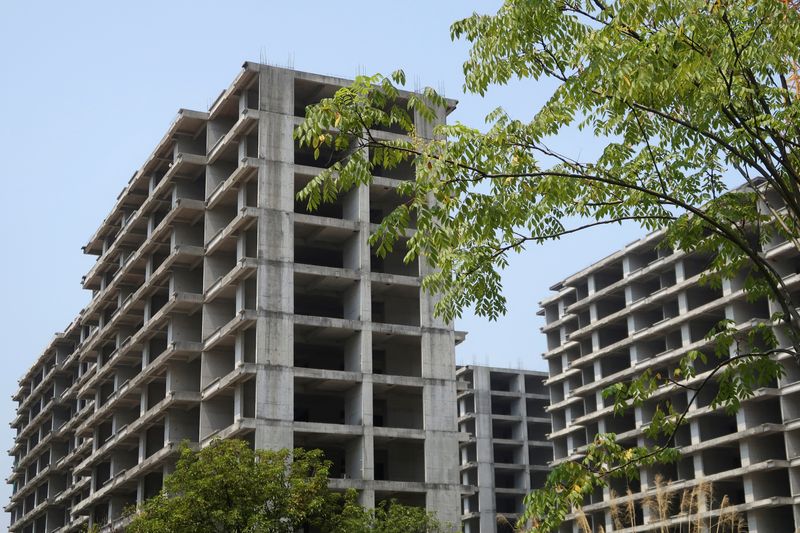By Liangping Gao and Clare Jim
BEIJING/HONG KONG (Reuters) - Real estate agents have been calling Daisy Wu non-stop to get her to buy an apartment in the southern Chinese city of Shenzhen, but the 28-year-old said she was too worried about the slowing economy to consider making a purchase.
Wu's concerns belie a raft of measures rolled out by the Beijing government this week to revive the economy and target the deepening crisis in its massive debt-riddled property sector which has been on the decline since 2021.
The measures include lower mortgage rates for first-time homebuyers, but analysts warn that like Wu, the sentiment among many Chinese is too weak for these moves to put a floor under the world's largest asset class, where roughly 70% of household wealth is invested.
"The loosening of mortgage rules doesn't relieve me of any stress," said Wu, who works for a pharmaceuticals firm. "Companies are laying people off or even shutting down. My boyfriend and I are too afraid to buy."
The slump in the property market is driven by more fundamental factors than the cost of borrowing, including broader debt worries in the economy, white-collar workers taking pay cuts, and a demographic downturn.
China's new home prices fell for the fourth month in August, a private survey showed on Friday.
"Although China has cut mortgage rates a few times since 2022, households do not seem to bother," Alicia Garcia Herrero, chief economist for Asia Pacific at Natixis, said in a note.
Leading developer Country Garden is scrambling to avoid default and fears of contagion to other property firms are mounting, creating an environment that does little to boost buyers' confidence.
Moody's (NYSE:MCO) said on Thursday it expects a lengthy recovery process for the sector amid lingering concerns that developers would struggle to complete projects as well as due to a slowing economy and high unemployment.
John Lam, head of China and Hong Kong property at UBS Investment Bank Research, expects more easing measures to be announced soon, but still sees property transactions dropping by about 15% in the second half of the year and by another 10% in 2024.
"Country Garden’s evolving credit event may exacerbate weakness in homebuyers' sentiment" Fitch Ratings said in a note, adding the impact would be larger in smaller cities.
'NOT ATTRACTIVE'
In Shenzhen and Guangzhou, people who have fully repaid their last mortgage or sold their homes are now eligible for smaller down payments and lower interest rates when they make a new purchase.
For Shenzhen homeowner Tina Zhuo, the new policy is "not attractive" as she does not want to sell her current home in what she calls "a buyers' market."
"I'm earning less so I don't want to risk looking for a better property," she said.
State-owned company employee Chen Yibo does want to sell his apartment in the smaller southern city of Nanning and buy a more expensive one in Guangzhou, where he works, but he is not finding any buyers.
Without making that sale, he cannot afford to buy. "Even the smaller down payment is too much for me," he said. "Only lower house prices and subsidies will work for me."
Wu, the pharmaceuticals worker, was last shown a flat selling for 1 million yuan ($137,697) less than the average price in that district.

"I was told that the price could be lowered by another 200,000 yuan, but we don't dare to buy it," she added.
($1 = 7.2623 Chinese yuan renminbi)